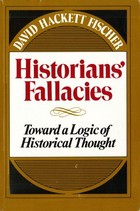 Why did Christianity begin and why did it become the primary religion of the West? Why did Islamic terrorism become a major concern of the West? . . . . In senior high school I was taught that the real interest of historians is to ask why things happened. Memorizing dates and facts missed the point. Some biblical scholars today stress the importance of asking the “why” questions about Christian origins.
Why did Christianity begin and why did it become the primary religion of the West? Why did Islamic terrorism become a major concern of the West? . . . . In senior high school I was taught that the real interest of historians is to ask why things happened. Memorizing dates and facts missed the point. Some biblical scholars today stress the importance of asking the “why” questions about Christian origins.
But ever since I came across historian Fischer’s Historian’s Fallacies I’ve not been so sure. To some extent I can understand what is meant by the appeal to dig into finding out “why”, but at the same time, and in the interest of clarity, I also find myself reflecting on this passage in Historian’s Fallacies:
In my opinion — and I may be a minority of one — that favorite adverb of historians should be consigned to the semantical rubbish heap. A “why” question tends to become a metaphysical question. It is also an imprecise question, for the adverb “why” is slippery and difficult to define. Sometimes it seeks a cause, sometimes a motive, sometimes a reason, sometimes a description, sometimes a process, sometimes a purpose, sometimes a justification. A “why” question lacks direction and clarity; it dissipates a historian’s energies and interests. “Why did the Civil War happen?” “Why was Lincoln shot?” A working historian receives no clear signals from these woolly interrogatories as to which way to proceed, how to begin, what kinds of evidence will answer the problem, and indeed what kind of problem is raised. There are many more practicable adverbs-who, when, where, what, how-which are more specific and more satisfactory. Questions of this sort can be resolved empirically, and from them a skilled historian can construct a project with much greater sophistication, relevance, accuracy, precision, and utility, instead of wasting his time with metaphysical dilemmas raised by his profound “why” questions, which have often turned out to be about as deep as the River Platte. (p. 14)
Alas, Fischer was not hopeful that his minority view would ripple out to move the entire pond:
It is improbable that this will happen, among historians, in the foreseeable future. “Why” questions are rooted in the literature and institutionalized in the graduate schools. . . .
I do wonder, however, if many modern historians have indeed seen the light — but I am basing this on only a small handful of recent historical works I’ve happened to read. I do see the concern for “why questions” to be at the forefront of inquiry among a handful of biblical scholars investigating Christian origins, however.
